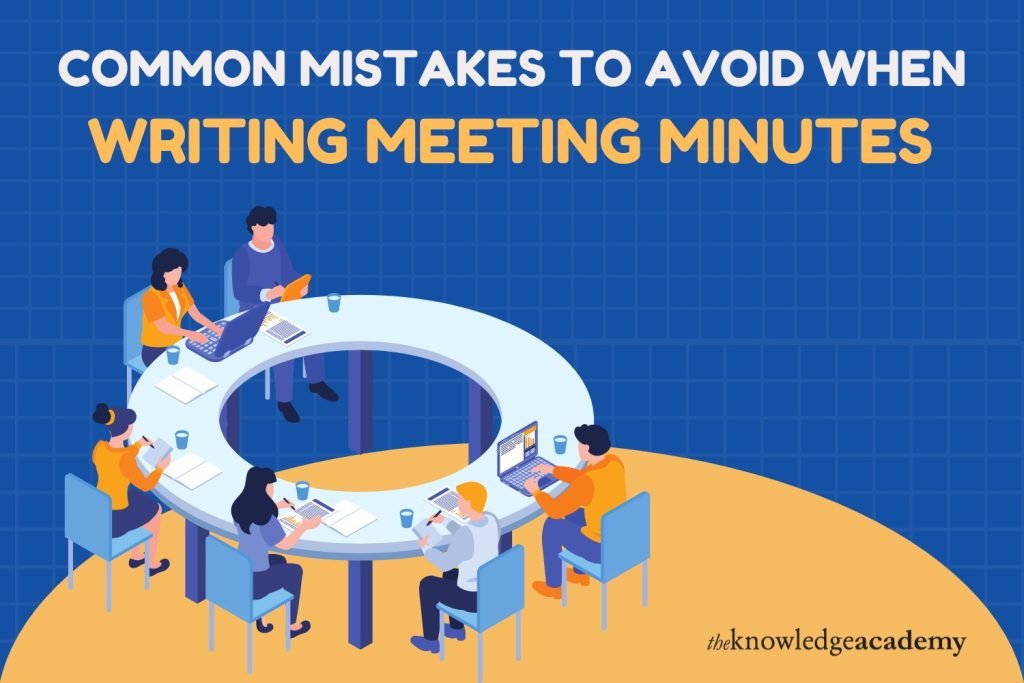Last updated on
Have you ever sat through a meeting, carefully noting everything, only to find that your minutes are more like a cryptic novel than a clear record of events and decisions? You’re not by yourself! Many of us find ourselves caught in the trap of over-documenting, catching every uh, ahh, and stop, rendering our minutes less valuable than they could be.

Even people who have pursued Minute Taking Certification can get paused in the practical use of their knowledge. Meeting minutes are vital for documenting important decisions, activities, and ideas that propel projects ahead. Yet even the best of us can trip up on simple mistakes that lessen their efficacy. Let’s explore the art of Minute Taking Skills and learn the mistakes you should avoid to master this essential skill.
Over-Documenting Every Detail
Believing you must precisely record the conference is the most prevalent minute-writing error. This not only is impractical but also leaves pointless information in the minutes. You are trying to capture the core of the conversation, but not every word is spoken. Emphasise important ideas, choices taken, and assigned actions. If you have written every point, pause and ask yourself: “Will this detail support understanding of the choice or action?” If not, it most likely doesn’t have to be in the minutes.
Under-Documenting – Missing Essential Information
On the flip side, over-documenting is under-documenting. This happens when minutes are too imprecise and lack the information needed to understand the results of a meeting. Including who attended the meeting—especially identifying important stakeholders or decision-makers—all decisions are taken and any necessary actions—including who is accountable and the deadlines—is vital. It is especially beneficial for those who missed the meeting and guarantees that everyone is aware of their obligations and the decisions made.
Not Using Clear, Concise Language
Your minutes need to be precise. Using twisted or too complicated wording can hide the intended meaning. Speak in straightforward, direct terms. Avoid terminologies unless they are industry-specific and known to all parties. Recall that those not in the room may refer to the minutes. So, adequate documentation is necessary.
Delay in Distributing the Minutes
The accuracy of the meeting minutes is only one aspect; another equally crucial is timeliness in their distribution. The more you wait to disseminate the minutes, the fewer memories are in everyone’s mind, and the more probable momentum on action items will be lost. Try to email the minutes 24 to 48 hours after the conference. Everyone is kept in line and responsible for this quick distribution.
Failing to Record Decisions and Rationale
Imagine going back over the minutes, weeks, or months later and discovering a choice without justification or background. This can be confusing and annoying. Always include, if relevant, a brief rationale for choices and who made the decision. This material will enhance future reference, particularly in questions or revisiting judgements.
Inaccurate Recording
Nothing less than errors compromises the worth of meeting minutes. Errors in implementation and major misunderstandings might result from misquoting someone, misstating a fact, or improperly noting a judgment. Review your notes always and, if feasible, confirm essential issues with the participants or the chairperson to ensure your minutes fairly represent the meeting.
Neglecting to Highlight Follow-up Actions
Minutes should specifically list action items and upcoming tasks. Separating or bold listing of these activities helps to highlight them. Every action item ought to have a deadline and a designated person. This guarantees responsibility and facilitates quick scanning of the minutes by participants so they may be aware of expected behaviour.
Conclusion
Try creating a checklist based on the above points for your next minute-taking task. Check each item as you prepare, write, and review your minutes. This will help embed these practices into your routine and ensure you cover all bases.
Effective minutes taking is much more than just writing down what is said during a meeting. It is an essential skill refined through programmes offered by The Knowledge Academy and involves far more than just recording what is said during a meeting. It’s about simplifying the core of conversations, choices, and behaviours into a structure that makes sense for every participant.
Recap:



